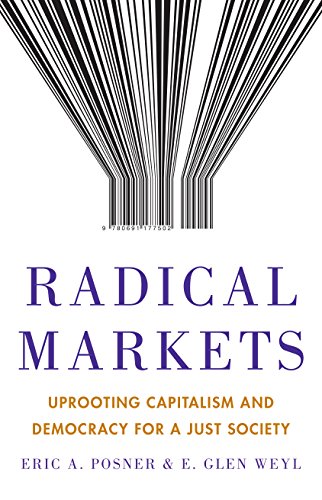Radical markets: uprooting capitalism and democracy for a just society
:ROAM_REFS:
See Radical Exchange

This book was recommended to me to increase the variance of what I read, which it did! The authors' thesis is that a couple of tweaks to markets (land, vote, immigration, data) could lead to a fairer, etc. world. During almost 3 hundred pages the authors walk the very periluous line that consists in acknowledging the markets' worst flaws while praising for more or the same to cure these ills.
There is one thing that we need to get out of the way before continuing. A classic line of this kind of book is for the author to pretend that they place themselves “beyond ideologies”, that is they only care about the well-being of the people without any preconception or desire about humanity rather than live, trade, die. This is what I call (the expression is not from me unfortunately): economics as an ideology. The idea that where people meet, our share legacy (see this review of Pierre Crétois' La Part Commune in French for reflection on private property), is mostly in trade. A simple way to spot this is that discourse tends to focus around a bag of tricks and not a coherent vision of who we are, what we want and where we would like to go. As a matter of facts, “economic agents” in often used to designate people.
Typical to EEAI is dismissal of the traditional left-right confrontation, e.g. on p276:
To build a better world we must live beyond the self-defeating conflict of right and left"
The conflict of right and left is how history progresses in a democracy, torn between the progressives that are thinking about a better world and conservatives who do not want the good parts of the familiar to be forgotten. Democracies like the US set a stage where these two conflicting desires can fight, with a bias against change if not consensual. Democracies are biased towards conservatives.
This vision has plagued French politics for a while already.
As Marx himself wrote in a letter to the (communist) German politician Friedrich Sorge about Henry George;
He also has the repulsive presumption and arrogance which is displayed by all panacea-mongers without exception.
Devoid of historical perspective and desire to wrestle with the reality of culture, EAAI has this general approach of picking society’s ills (poverty, typically) and provide a set of seemingly unrelated miracle solutions. Not without the arrogance that one can indulge in when the remedy they sell is currently inapplicable. This book is no exception. Don’t be deceived by the tone of the review, however, I typically enjoy these book for the new ideas, in the same way I always like a good science-fiction book.
Georgism #
Or how a single tax with make your lost love return, your hair grow back and end world poverty.
Quadratic Voting #
One virtue of democracies is robustness. Simplicity is great. Quadratic voting is an interesting idea for polls, however. People should probably be spending more time thinking about public life, but certainly not about tools.